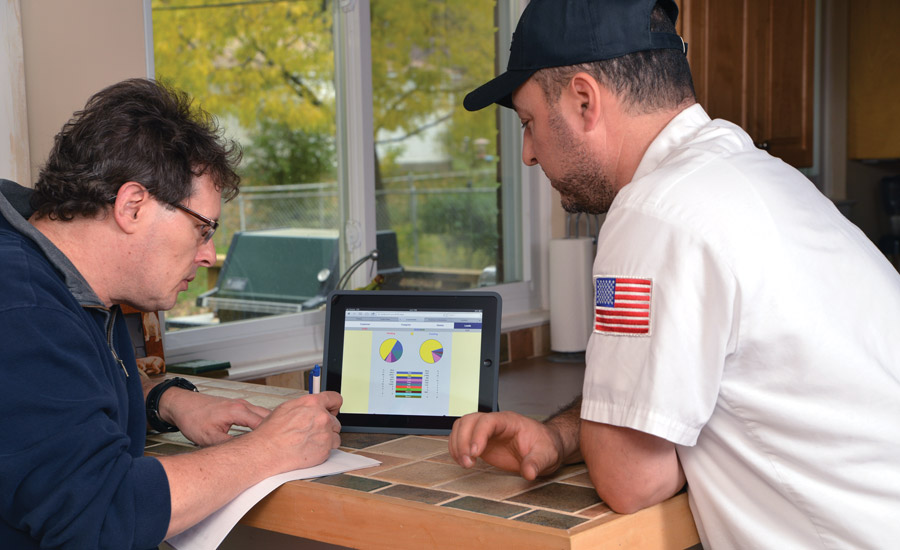Reputable sales people are crucial to an HVAC company, but so are good customer service representatives. Quality employees know how to talk to customers and explain the products and services to them without being offensive.
A recent column in the Detroit Free Press gained a lot of attention in metro Detroit when the writer used the platform to vent her frustrations in trying to get a quote from a window company. She was told the company would not visit her home without her husband present, a factor that had many female readers outraged.
There are obviously benefits to having both decision-makers present when making a sales call, but HVAC contractors, just like those in other industries, must walk a fine line when pitching a sale when a significant other is absent from the conversation.
DON’T FORCE THE ISSUE
Scott Merritt, owner of Columbus, Ohio-based Fire & Ice Heating & Air Conditioning Inc., said his company asks if all decision-makers can be present during the time of an estimate, but does not require it. “In todays’ day and age, it’s not always possible. One spouse will collect all information, and then they’ll both sit down and determine questions or decisions. We must be vigilant in getting back to them very quickly when they call or email with questions. The speed of response is critical in helping them form an opinion of which company they choose.
“In order for you to close the job on the spot, you absolutely have to have any and all decision-makers present. Otherwise, you have to wait and hope,” Merritt continued.
Rob Minnick, CEO and president, Minnick’s Inc., Laurel, Maryland, agreed, saying homeowners use it as an excuse to delay making a decision.
“We ask if the decision-maker(s) will be present at the time of our visit,” Minnick said. “If not, we ask if we could set up a time when he or she will be there. Sometimes this works, and sometimes it doesn’t. We do the best we can, though we try — and prefer — to have them there, if at all possible. The reasoning is because it helps close the sale. When they’re not there, they say, ‘I need to go over it with my spouse/other decision-maker.’”
Steve Moon, owner, Moon Air Inc., Elkton, Maryland, said having both decision-makers present saves time and allows his employees to run more sales calls because they do not need a return visit, but, at the same time, many people feel insulted being told they cannot make a decision on their own.
“Most often, it’s the lady of the house left to collect bids, and refusing to talk to her alone can be a huge no-no,” he said. “We’re dealing with a much more sophisticated client than ever before. They’re educated and have a pretty good idea of what they think they want.
“The client doesn’t realize how important it is for everyone to be present so they can actually get the best option for the right price,” Moon continued. “They like to hide one decision-maker so they lessen the pressure to ‘buy tonight.’ This is a stall. They think because they need to talk to their spouse, it protects them so they can gather prices and then decide. When they go by price alone, failure is probable. Someone will not get what they expected because they weren’t at the sales call to voice their concerns. Then, the big, bad a/c guy screwed them. This is why it’s best to have everyone involved at the sales call with a professional HVAC salesperson to advise them and come up with the perfect system to suit their needs.”
BE FLEXIBLE
According to Dave Knight, sales manager, Thornton and Grooms, Farmington Hills, Michigan, about half of the replacement calls that come in are usually no-heating or no-cooling situations. “Something needs to be done right away. We schedule the appointment based on the customer’s convenience, so it doesn’t matter if there’s a missing homeowner. We go based on the availability of the customer, which is usually right away. We don’t make any effort to try to get all the decision-makers there, but we will try to bring them into the conversation if both aren’t available at that time.”
There are many variables homeowners need to consider when making a replacement decision, so Thornton and Grooms replacement specialists do their best to provide all of the information decision-makers need to make the right choice.
Often, if a spouse or decision-maker is out of town or at work, the specialist will ask if they can become available to hear a portion of the conversation so that they understand the options available and how those options can impact comfort, safety, ROI, and efficiency, Knight said. They do this by asking to get the person on the phone or email. They even use text messaging and FaceTime as a means of communicating.
“Efficiency, comfort, reliability, and safety are important to that other person, as well, because we’re all different,” Knight said. “Take a look at what the bed manufacturers have done — they’ve split the bed in half. Some people like it firm, and others like it soft. Some people like it hot, and others like it cold. If one person were to go make a decision on a bed, they would buy what they feel is the most comfortable. We feel it’s incredibly important for all decision-makers to know as much as possible about this decision, because, really, they have one chance to make it right. We’ve had customers come back to us once they’ve replaced their system, wishing they would’ve done something else, and it’s because they were in such a rush. We simply weren’t able to go through the process with them.”
Additionally, Thornton and Grooms is very aware that most people are gathering information and are not going to make a decision at the time of the estimate. “We’re not at all pushy or demanding that all decision-makers need to be there or we won’t schedule the appointment. We’re very aware and sensitive to offending people. We would rather start off on the right foot and earn their trust bit by bit rather than force a process upon someone who could be offensive. In the same breath, we do recognize how important it is, and we try to make sure the customer understands that this is a benefit for them. We’ll schedule a second appointment to go back, if they wish.”
Jeff Payne, sales coordinator, Cross Heating & Air Conditioning Ltd., Listowel, Ontario, Canada, agrees it’s beneficial to have both decision-makers present at the time of the estimate.
“While we don’t require it or even request it, it’s always better to have both there during the site visit,” said Payne. “We all realize how little the average homeowner knows about today’s HVAC systems. We all spend a great deal of time coming up with clear ways to explain the various features and technologies and answer all the questions that may come up. It’s a bit of a shame to see all the hard work you put into your presentation to one spouse get boiled down to, ‘The furnace guy was here and he said the furnace would be $3,500’ when that spouse presents it to the other after you’ve left. A consultant definitely has the advantage if he or she can present to both parties at once versus having one try to regurgitate all the details to the other. Unfortunately, most families have crazy schedules, and getting both spouses to sit down at the table at the same time is getting harder and harder to do.”
Keith Bunn, territory manager at Dealers Supply Co. Inc., Forrest Park, Georgia, said it can also be beneficial for the decision-makers. “It’s not about bidding replacement equipment; it’s about solving a problem. If you’re not meeting with all of the homeowners, you can’t identify and solve their problems. You definitely cannot prove your value if you’re unable to demonstrate how you came to this conclusion.”
Bunn suggests eliminating the uncomfortable conversation of asking if both homeowners will be present altogether and just scheduling the sales call at a time that gives you the best opportunity to make the sale. “Try 7 p.m. sales calls Monday through Friday, or 10 a.m. on Saturday morning.”
Lowell, Arkansas-based Bud Anderson Heating and Cooling schedules sales calls seven days a week to increase the chance of having both decision-makers present, said Tim Paetz, general manager and co-owner. “We let our clients know we’d like everyone who is going to help in the design considerations of the home comfort system be present at the time of the visit. We try to make them understand that we are going over a lot of options, so everyone should be available to ask questions. With some folks, it’s impossible to do this. So, sell the person you’re in front of, and, if you do a good job, they’ll sell you.”
GOING SOLO
The economy has begun to show signs of stabilization over the past year, and that, combined with Magic Touch Mechanical Inc.’s growing home-performance department, has put Rich Morgan, president of the Mesa, Arizona-based company, back into a sales role.
“We found we had more new equipment sales leads than we had sales consultants to handle the work load. It broke my heart to see our marketing dollars working so well only to not be able to take the leads. After many years of sitting behind the desk, I’ve put the sales hat back on and gone out to do some kitchen-table selling.”
Morgan said he now runs two to three sales leads per day. “My closing rates are fantastic, and it’s taught me a lot about our clients and how the market has changed over the years. I would say, 75 percent of the time, my calls are ‘one-leggers,’ and yet, my close rate is much higher than what the industry normally refers to as good. I believe if your sales presentation is on point, you don’t need to have both homeowners there to close the sale. If you do everything right, the wife or husband is going to tell the other, ‘This is the company we want.’”
Morgan said his company used to attempt to schedule based on both decision-makers being home, but he found too many customers didn’t like that approach, since it was on the verge of “belittling the person scheduling the call.”
Morgan feels that Magic Touch has gained an advantage over competitors by discontinuing that practice.
“I’ve heard from a few clients who said they didn’t like that our competitors only wanted to schedule an appointment when both homeowners were home, and the fact that we didn’t actually gave us the competitive edge,” Morgan said.
Butch Welsch, owner, Welsch Heating and Cooling Co., St. Louis, said he doesn’t feel it’s “necessary or appropriate to have both individuals at home when making an evaluation and proposal.” Instead, this type of sales tactic immediately makes the homeowner wary and distrustful that he or she will be in for a strong-arm type of sales pitch, Welsch added.
“The majority of our proposals are for our own customers — we have a current list of our 16,000 active customers — and we have a very good closing rate, so we don’t want to change the image of our company. Maybe we lose a few sales to the companies with the more aggressive sales tactics, but, in the end, I can always look myself in the mirror and feel comfortable that we’re not taking advantage of our customers.”
Welsch said his sales people do spend time with new customers to explain his company’s 120-year history and the way it does business, but they still don’t expect both decision-makers to be present.
“If my wife called someone for a proposal, and that company wanted me at the home at the same time, she would hang up on them,” he said. “She’d consider it a questioning of her authority to make decisions in our home, and she knows she has the authority and power to make the decisions she wants.”
Publication date: 9/7/2015
Want more HVAC industry news and information? Join The NEWS on Facebook, Twitter, and LinkedIn today!











